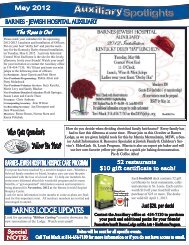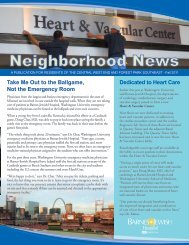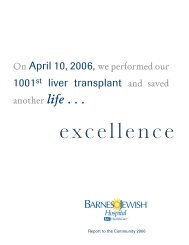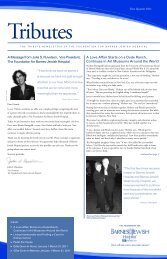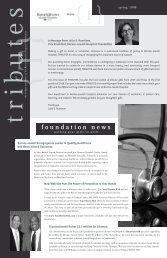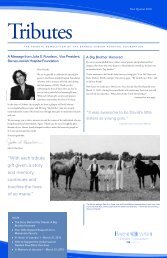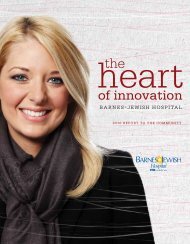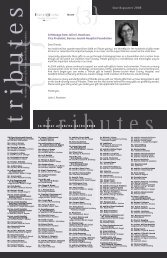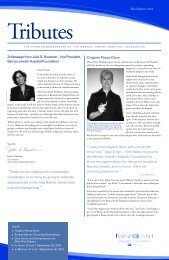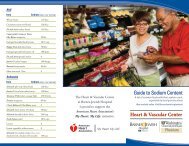D EFIN IN G M O M EN TS - Barnes-Jewish Hospital
D EFIN IN G M O M EN TS - Barnes-Jewish Hospital
D EFIN IN G M O M EN TS - Barnes-Jewish Hospital
- TAGS
- efin
- www.barnesjewish.org
You also want an ePaper? Increase the reach of your titles
YUMPU automatically turns print PDFs into web optimized ePapers that Google loves.
Unique program combats compassion<br />
fatigue to improve patient care<br />
An extremely large proportion of intense experiences—birth,<br />
death, trauma, dire illnesses, dramatic procedures—occur at<br />
<strong>Barnes</strong>-<strong>Jewish</strong> <strong>Hospital</strong>. The health care staff is on the front lines<br />
of these experiences, which can lead to compassion fatigue.<br />
Compassion fatigue is described as the “cost of caring”<br />
for others in emotional pain. Compassion fatigue is a form<br />
of traumatic stress that can cause feelings of inadequacy<br />
as a caregiver, the inability to let go of work-related issues,<br />
loss of hope, lack of energy and irritability. It also can cause<br />
caregivers to become less empathetic and less engaged<br />
with patients.<br />
In 2009, because of concern about compassion fatigue,<br />
three nurse managers from oncology units at <strong>Barnes</strong>-<strong>Jewish</strong><br />
approached Patricia Potter, RN, PhD, director of research<br />
for patient care services, and Teresa DeShields, PhD, manager<br />
of psycho-oncology services. Potter and DeShields conducted<br />
a survey of staff on the oncology units and found that burnout<br />
and secondary traumatic stress were high enough to warrant<br />
intervention to help caregivers and patients.<br />
“Secondary traumatic stress comes from caring for people<br />
who are experiencing trauma,” Potter says. “Repeated<br />
exposure to patients’ loss, pain and suffering can lead<br />
to similar feelings in the care providers.”<br />
As a result of the survey findings, The Foundation for<br />
<strong>Barnes</strong>-<strong>Jewish</strong> <strong>Hospital</strong> funded a successful pilot program in<br />
2010 for oncology nurses to combat compassion fatigue and<br />
stress. Soon, staff in the emergency department and intensive<br />
care units began attending compassion fatigue classes.<br />
In 2011, The Foundation funded an initiative to roll out<br />
the Compassion Fatigue Resiliency Program to all hospital<br />
employees—with a recognition that even if employees are<br />
not giving direct clinical care or treatment, they still may<br />
be involved in caring for the hospital’s patients, and are<br />
vulnerable to the cost of caring.<br />
Unique in the United States, the program was developed<br />
specifically for <strong>Barnes</strong>-<strong>Jewish</strong> by Eric Gentry, PhD, a certified<br />
traumatologist and pioneer in the field of compassion fatigue.<br />
Through the Compassion Fatigue Resiliency Program, the<br />
health care staff learns skills to recognize signs and to prevent<br />
compassion fatigue.<br />
“It helps remind caregivers that they’re doing this to relieve<br />
patient suffering, or to give hope,” says Cheryl Palmer,<br />
manager of spiritual care services at <strong>Barnes</strong>-<strong>Jewish</strong>. “Being<br />
able to help patients through stressful times, to help them<br />
recover, to comfort their family, to changes lives and to<br />
witness people’s lives being changed can be immensely<br />
moving and fulfilling. It’s more than a job. It’s a calling<br />
for some people to work in health care.”<br />
“I can tell they’re (the nurses)<br />
emotionally invested in<br />
me and my outcome.”<br />
– cindy reardon<br />
Recognizing the connection and<br />
commitment of nurses<br />
Cindy Reardon knows what the cancer coaster is.<br />
In fact, she’s been riding it for almost a year. Reardon<br />
was diagnosed with stage 4 ovarian cancer in June<br />
2011. Immediately following her diagnosis, she had two<br />
operations within a week. The first one, video-assisted<br />
thoracoscopic surgery (VA<strong>TS</strong>), involved draining<br />
fluid from her right lung, since the cancer had spread.<br />
This was done in her hometown of Marion, Ill.,<br />
at Heartland Regional Medical Center.<br />
She came to <strong>Barnes</strong>-<strong>Jewish</strong> for her second operation—<br />
a total abdominal hysterectomy and bilateral salpingooophorectomy<br />
and staging. Since then, her treatment has<br />
included a number of chemotherapy drugs in an attempt<br />
to find the one that is most effective for her. She and her<br />
Siteman Cancer Center oncologist, Matthew Powell, MD,<br />
discuss the ups and downs of the cancer coaster. “It’s<br />
definitely like a roller coaster because one day there is<br />
good news and the next day it’s bad,” says Reardon.<br />
Reardon knows that she’s not alone on the cancer coaster.<br />
Her nurses and patient care team ride the coaster with<br />
her, offering support and compassion when she needs it<br />
and celebrating even the smallest successes. Lucy Hertel,<br />
RN, is Reardon’s <strong>Barnes</strong>-<strong>Jewish</strong> nurse coordinator. As<br />
Reardon puts it, she’s Powell’s right-hand man and the<br />
person that Reardon calls with questions or concerns.<br />
LEFT: The hospital’s compassion fatigue facilitators<br />
come from all areas of the hospital including (from left)<br />
Marty Clarke, cancer psychiatry consultations service;<br />
Kathleen Walton, social worker; Julie Berger, chaplain,<br />
oncology services; Brent Brazell, human resources;<br />
Patricia Potter, director of research and patient care<br />
services; and Cathy Powers, clinical nurse specialist.<br />
RIGHT: Patient Cindy Reardon (left) attends one of her<br />
last chemotherapy treatments with Lucy Hertel, RN.<br />
“I’ve gotten to know Lucy and many of the other nurses<br />
that help treat me. Since I’ve been coming for treatment<br />
every three weeks, we’ve ventured into each other’s<br />
personal lives now. I can tell they’re emotionally invested<br />
in me and my outcome,” says Reardon.<br />
“I wanted to show them how much I appreciate what<br />
they’re doing for me. I treated them to Fanny May candy<br />
at Christmas. Recently, I went to the hospital gift shop<br />
and bought Amanda Kracen, my psychologist, a plant.<br />
I’ve decided to bring someone a gift every time I have<br />
an appointment,” she says.<br />
Reardon may not be buying too many more gifts.<br />
Her current chemotherapy medication seems to<br />
be working wonders for her.<br />
22 BARNES-JEWISH HOSPITAL • 2011 Annual Report<br />
D<strong>EF<strong>IN</strong></strong><strong>IN</strong>G MOM<strong>EN</strong><strong>TS</strong><br />
23<br />
COM PA SSION FATIGU E



